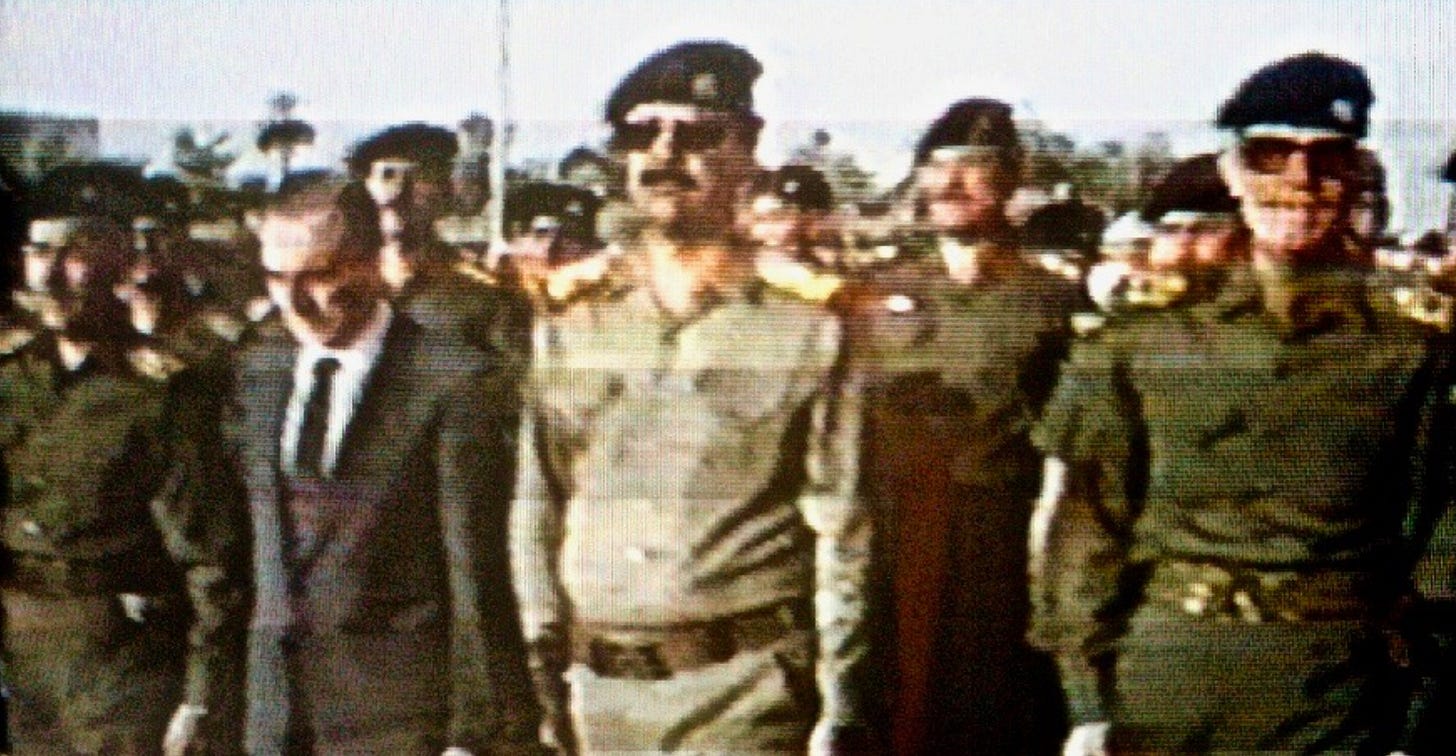A Requiem For Ba'athism (Part 2 of 3)
The Birth and Rise of Ba'athism, Factionalism and Schism, Nasserism and the Syrian-Egyptian Union, Six Day Catastrophe, Cold War Dichotomy
Part 1 of A Requiem For Ba’athism
The overwhelming global dominance of the West in the first half of the last century meant that those in the rest of the world had to respect the power of France, the UK, Germany, the USA, and so on. There was no benefit in just resenting them if you wanted to free your own people. That kind of thinking was defeatist, often fatalist, and only led to turning inwards or traveling down dead end paths.
Arabic/Islamic thinkers like Sayyed Qutb spent time living in the West and concluded that there was no liberation outside of Islam despite the obvious power imbalance between those cultures and the West at the time. Qutb felt that Muslims needed to return to basics, as straying from Islam is what caused the corruption that led them to fall behind the West. More recent Salafi thought leaders have gone further, insisting that everything non-Islamic was to be purged in the Islamic State that was to be ruled by Shari’a.
In parallel to these early Islamists, there were other Arab intellectuals who had also spent time in the West and yearned for Arab liberation from foreign dominance. Unlike the Islamists, they rejected the notion that freedom could only come through Islam. In fact, they liked what they saw in places like France and felt that secularism could unite Muslim and Christian Arabs against their Anglo-French occupiers. To these men, Islam was an impediment to both liberation and progress (even if they could not say it themselves), a ‘backwards’ and ‘superstitious’ faith that divided Arabs against one another. They also were romanced by the socialist strains in Europe, feeling that economic redistribution could serve reduce the lord/serf system still prevalent in Arabic society. These intellectuals were the original Ba’athists.
B. Ba’athism
It’s interesting to note just how many 20th century non-western revolutionary leaders spent time in the West. Iran’s first post-revolution Supreme Leader Ruhollah Khomenei represents those whose sojourns were brief, having spent only the three immediate months in a suburb of Paris, France prior to his triumphal return to Iran in January of 1979. We find someone much more interesting at the other end: Vietnam’s Ho Chi Minh. First arriving in France as a kitchen helper aboard a French steamer in 1911, he went on to become one of the founders of the French Communist Party in 1920 and gained most of his political philosophical education there before decamping to the Soviet Union, and later, China.
Emigres and exiles from the Arab world living in France did not fail to be influenced by the political trends taking place during the tempestuous interwar era. Two Syrian schoolteachers who had studied at the prestigious Sorbonne University had returned home to Damascus to teach at the all-male al-Tajheez school. Michael Aflaq (1910-1989) was Greek Orthodox, while Salah al-Bitar (1912-1980) was a Sunni Muslim. Both hailed from the conservative Damascus neighbourhood of al-Midan, and both came under the influence of the French Communist Party during their studies at Sorbonne.
Both had also been influenced by another Syrian alumnus of Sorbonne, Zaki al-Arsuzi (1899-1968). He too was a schoolteacher who went to France for training and education, and he too returned home under the influence of French political currents, setting up a movement of intellectuals called al-Baath (The Revival). Despite the obvious similarities, Arsuzi and Aflaq could never get along with one another, leading the younger figure to take a more pro-active approach on behalf of Arab nationalism, officially launching a political party with al-Bitar called al-Ba'ath, enraging the older man. Not only was Arsuzi not given a position within the newly-founded party, he was not even invited to its founding conference in April of 1947.
The Arsuzi-Aflaq rivalry having its beginnings at the very start of the Ba’athist movement symbolized the factionalism and personal rifts that went on to colour it over the course of its history. A Pan-Arab political philosophy succumbing to constant splits and schisms is ironic, but should surprise no one familiar with political history, not just in the Middle East, but beyond it as well. The fact that this initial split took place between two middle class Damascene school teacher Sorbonne alumni makes it rather humourous, at least in my opinion.
Aflaq and al-Bitar cast a wider net, seeking to incorporate more Syrians in their nascent movement, giving prominent positions to Jalal Sayyed of Deir Ezzor and Wahib Ghanem (1919-2003), an Alawite physician from Latakia.1 Syria was a very conservative country, only a little over two decades on from being part of the Ottoman Caliphate. Introducing a secularist ideology into a land that was guided by Islam for well over a thousand years was never going to be easy. Making it more difficult, secularism was a western import, a product of the very same contemporary occupiers and ruling authorities! For the first decade of its existence, Ba’athism in Syria remained largely a Damascene affair, with little to no penetration in the countryside.
War With Israel, Coups and More Coups, and Nasserism
Just as the Ba’athists were getting their feet wet in the political pond, the catastrophic Arab-Israeli War of 1948 upended everything in the Arab world. Aflaq personally volunteered for the war effort (in which he took part), and the disastrous performance of the Syrian Army led to him supporting a coup d'état in early 1949. Despite his support for General Husni al-Zaim’s2 toppling of the al-Quwatli regime, the Ba’ath party was outlawed, and Aflaq was imprisoned and tortured by the new authorities.
The al-Zaim coup ushered in a Spanish-like era of constant coup attempts, some more successful than others. Syrian Ba’athists lent support to Colonel Adib al-Shishakli (1909-1964), a powerful figure who launched two successful coups, the first being in 1949, and the second one following two years later. Despite al-Shishakli and Aflaq being comrades who knew one another as vets from the war a few years prior, the former had the Ba’ath party dissolved, forcing the latter and al-Bitar to flee into exile in Lebanon. It was there that the two decided to merge their party together with the Arab Socialist Party (whose leader Akram al-Hawrani (1912-1996) was also exiled there by al-Shishakli) to create the Arab Ba’ath Socialist Party.
Unlike the founding duo of the party, al-Hawrani was volatile, charismatic, and most of all, vengeful. He had come from a wealthy landowning family who had been dispossessed:
His Arab Socialist Party was founded on Marxist ideology and centred around a cult of personality. He lashed out against the feudal establishment, accusing them of hoarding the country's wealth and enslaving the farmers who ploughed the land.
The villages, he reminded the peasants, had no electricity, water, clinics or schools. Al-Hawrani called on farmers to rise in revolt. He would visit them at their homes, remind them they did not own their farms and say: 'If you work with me, this land could be yours!' He positioned himself as God-given saviour of Syria's peasantry, who made up 2 million of its 3.5 million population.
He is also credited with single-handedly introducing new terms into Syrian politics like 'classless society' and 'rule of the working class.' Before al-Hawrani, such terminology was completely absent from the Syrian dictionary.
Prime Minister Khalid al-Azm claimed that al-Hawrani pledged to 'fill the empty stomachs of farmers' with promises of land ownership. His 'Land Belongs to the Peasant' campaign took Syria by storm. Thousands answered his rallying cry and chanted: 'Fetch the basket and the shovel to bury the Agha and the Bey.'
Al-Hawrani turned agitation into violence and encouraged his supporters to burn crops, attack landlords, and make the villages too dangerous for their owners to enter. The Damascus daily al-Fayha wrote: 'Ever since your youth, you have been feeding on spite, malice, and dissension. You love to play with fire, even at the risk of burning yourself, your people, and your country.'3
al-Hawrani destabilized newly-independent Syria by way of the dreaded Agrarian Question, an issue that had vexed countries on several different continents.
1954 saw yet another coup in Syria, permitting the exiled Ba’athist leaders to return home and to participate in government. al-Bitar became the country’s foreign minister, while economics portfolio was given to Khalil Kallas, also a Ba’athist.




